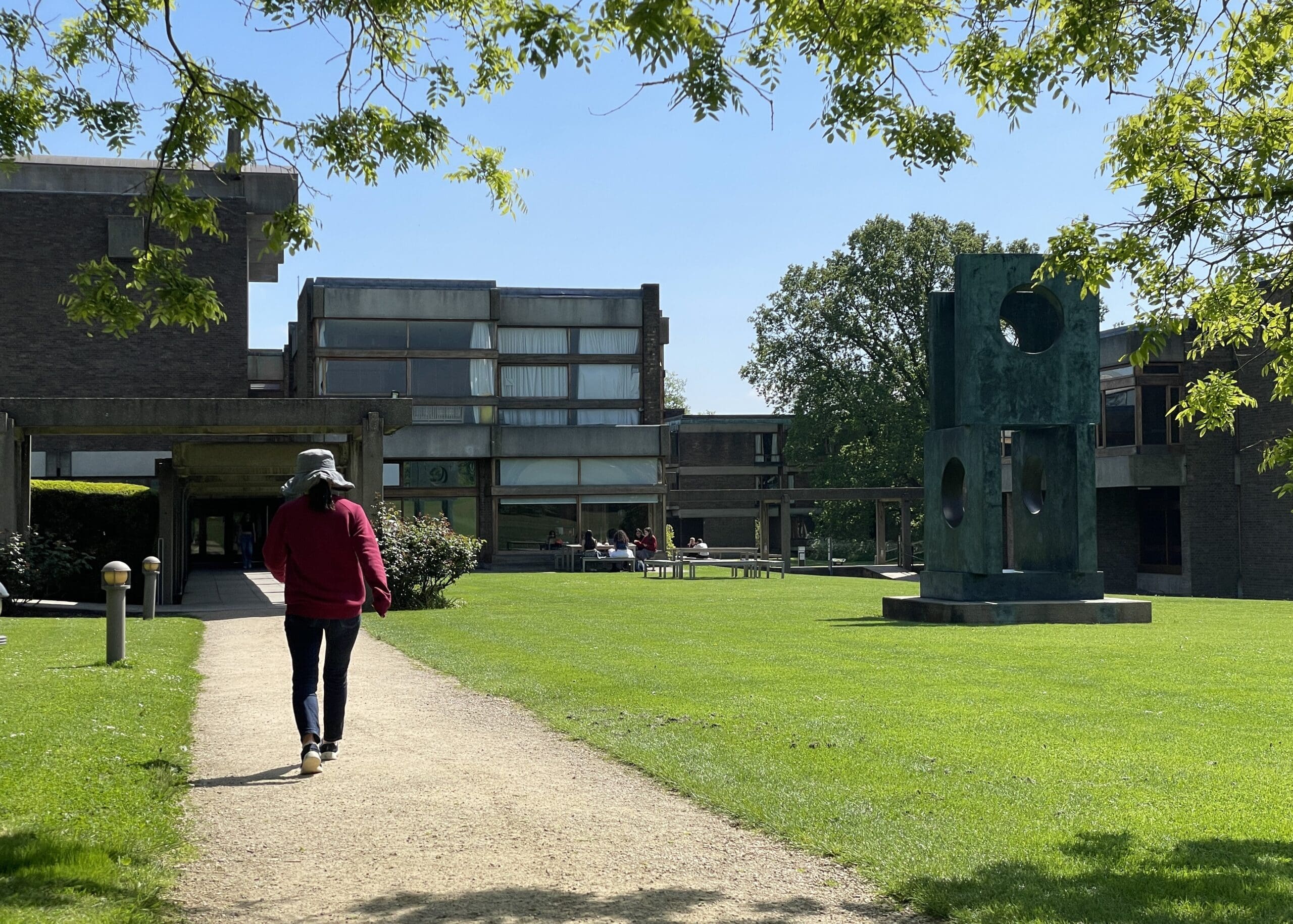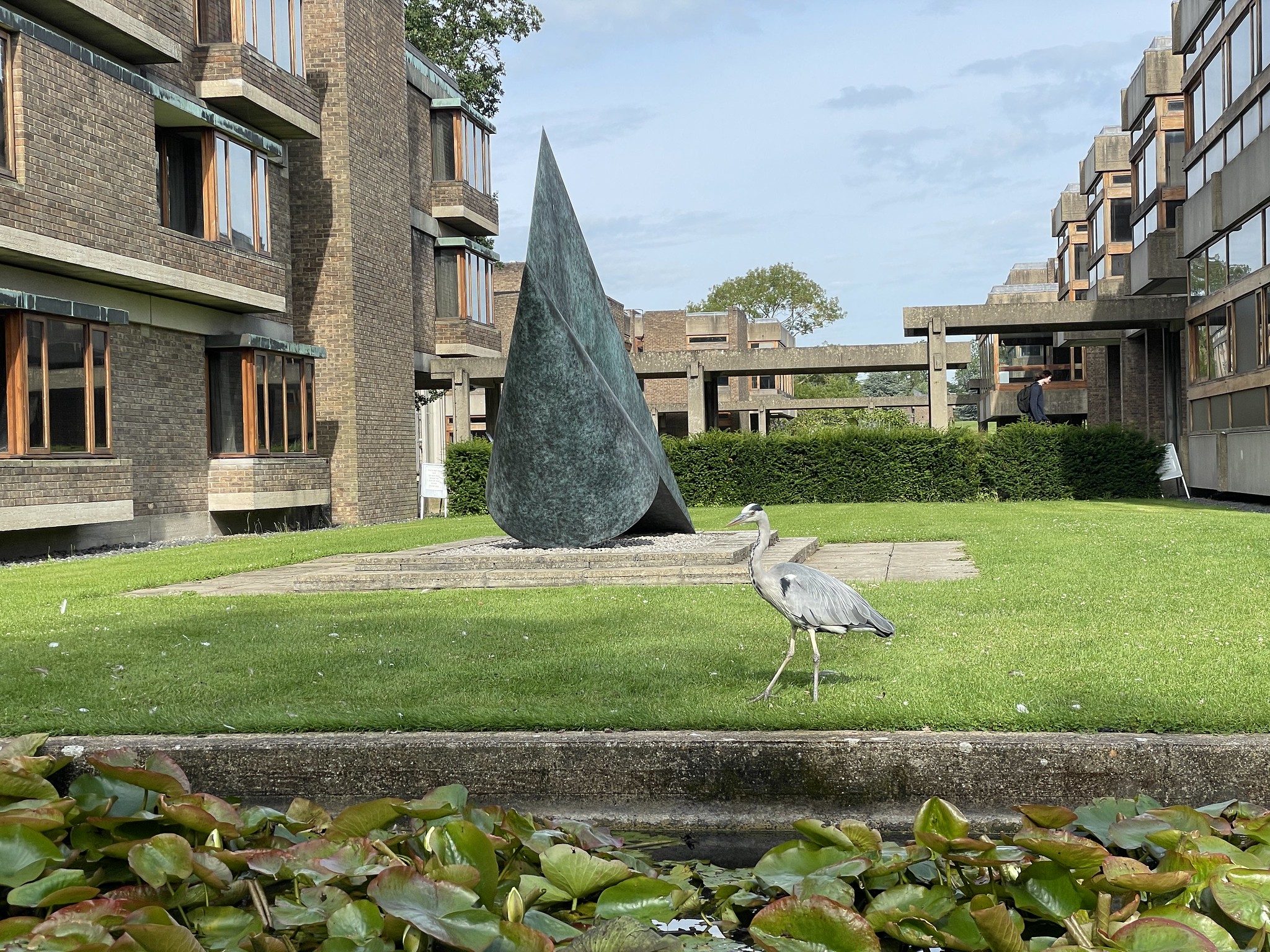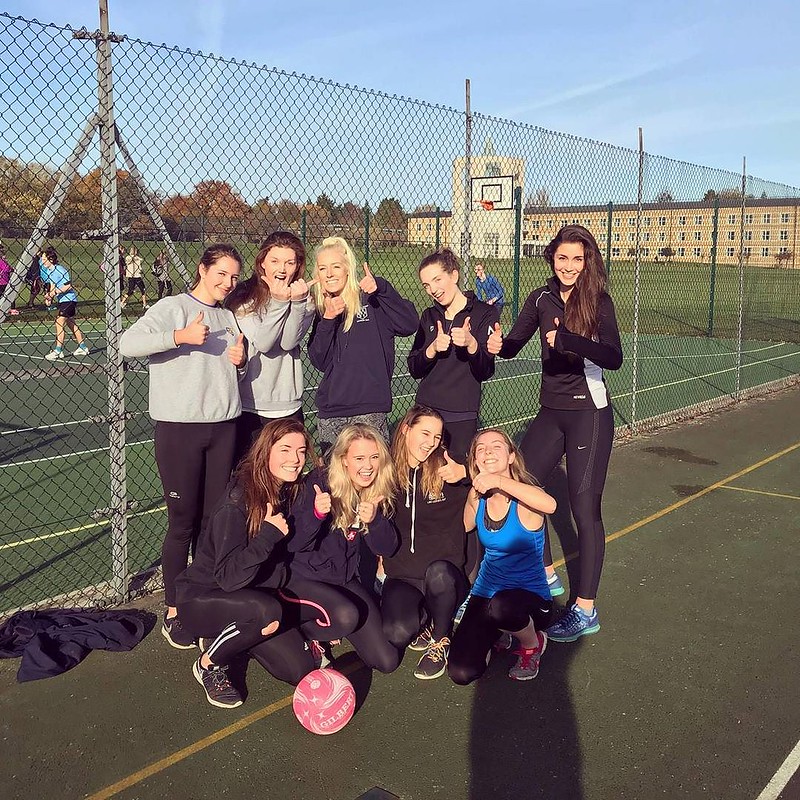Undergraduate Applications
Every year, we provide undergraduates with a world-class education, challenging them to achieve their full potential.
Churchill is an academic community devoted to excellence in learning, scholarship, and research. Regularly ranking amongst the top Cambridge Colleges in exam results and with over 30 Nobel Prize winners amongst our Fellowship, Churchill has the very strongest intellectual reputation.
Undergraduate applications are handled by our Admissions Office, where our Lead Admissions Tutor oversees the recruitment and selection of prospective students. You’d apply to Cambridge through UCAS, choosing Churchill as your preferred campus.
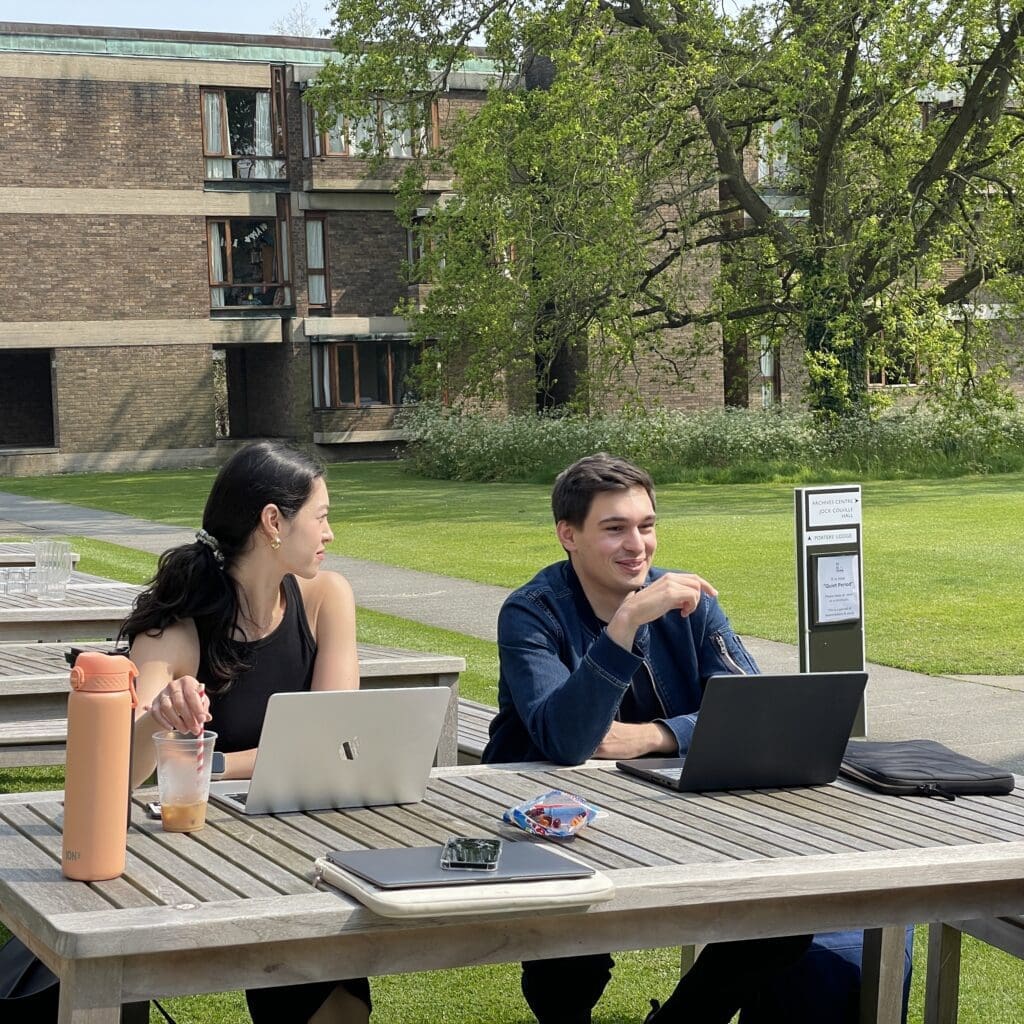
This page indexes content about the Churchill (Cambridge) undergraduate application process, so you can easily find what’s relevant to you. If you’d prefer a comprehensive start-to-finish overview of the process, check out our undergraduate pre-applicant pack.
Before you apply
Application process
Useful information
Choosing a college
Cambridge University is collegiate, meaning that if you come here you’ll be a member of both the University and one of its Colleges.
When you apply to Cambridge through UCAS, you can choose a preferred College, and then that College will assess you for admission on behalf of the University. If you have no preferred College, you can make an open application and you will be allocated to a College.
All undergraduates of the University on the same course attend the same lectures, seminars, and practicals, regardless of the College they attend. They sit the same exams and assessments too, and the degree they eventually get is from the University, not their College. For most students, the key things about their College is that it’s where they live and where their Directors of Studies and Tutors (core providers of academic and pastoral support) are based.
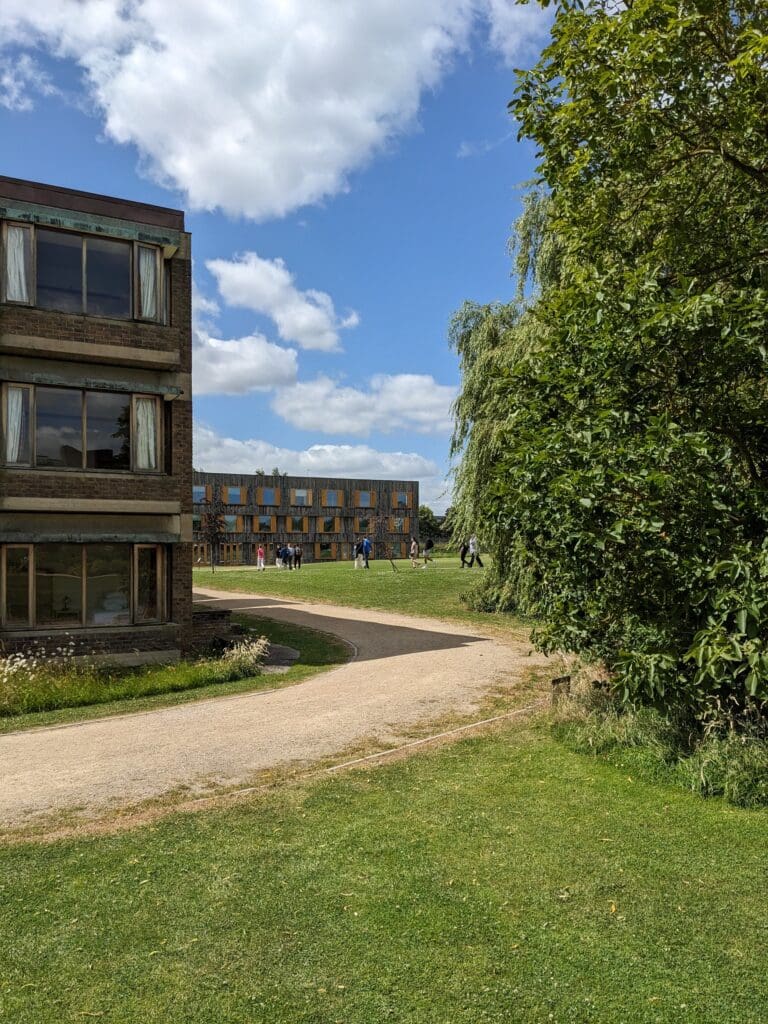
Differences between Colleges include age, look, location, size (physical and/or student numbers), and provision of facilities on-site, like accommodation, extra-curricular resources, etc. Also, some Colleges don’t offer all the University’s courses. Churchill, for instance, doesn’t offer Land Economy or Theology, Religion, and Philosophy of Religion.
Churchill admits around 140 new undergraduates each year, making us one of the larger undergraduate Colleges. Our modern campus-based site is the largest in Cambridge and uniquely combines in one place huge swathes of open space with pretty much everything you could need for work or play.
We guarantee all undergraduates on-site accommodation for the three or four years of their course.
You can find out more about what you need to know before applying to Churchill in our pre-applicant pack, and more about the College campus and facilities on this website.
Churchill College:
Established as a purpose-built College in 1960
Modernist architecture set in 42 acre park
Relatively large College (140 undergraduates each year)
Offers all courses except Land Economy, Theology, Religion or Philosophy of Religion
Guaranteed on-site accommodation for length of undergraduate course
Learning at Churchill
Cambridge Colleges provide each undergraduate with a Director of Studies (DoS), responsible for steering and facilitating their learning.
Each DoS is expert in their subject(s). A great many are world-class researchers.
In Churchill, most DoSs are Fellows (academic staff members) of the College. DoSs meet you at the beginning and end of each term to give formal advice and guidance, but they’re also available throughout your undergraduate career if issues crop up that need attention or action. Churchill’s DoSs are notably pro-active and immensely committed to their students’ academic development and well-being.
The main job of our DoSs is to arrange your supervisions – the weekly, small-group tuition that is distinctive to learning at Cambridge.
Supervisions are tremendously rewarding, for you and your supervisors. They allow us to challenge and stretch you, and enable you to develop your understanding of the topics that interest you most. The result is that your learning is broadened, deepened, and made as stimulating and enjoyable as possible.
If you need to improve particular aspects of your learning, Churchill runs specialist support and study skills sessions, covering everything from note-taking and essay-writing through to examination technique.
Course-related socialising and community building are important to academic development. At Churchill, many subjects run academic student societies in which outside speakers give talks or students make presentations on their work. Sessions are often linked to social events and each year whole-College subject dinners allow Fellows, postgraduates, and undergraduates to get together and talk in a less academic setting.

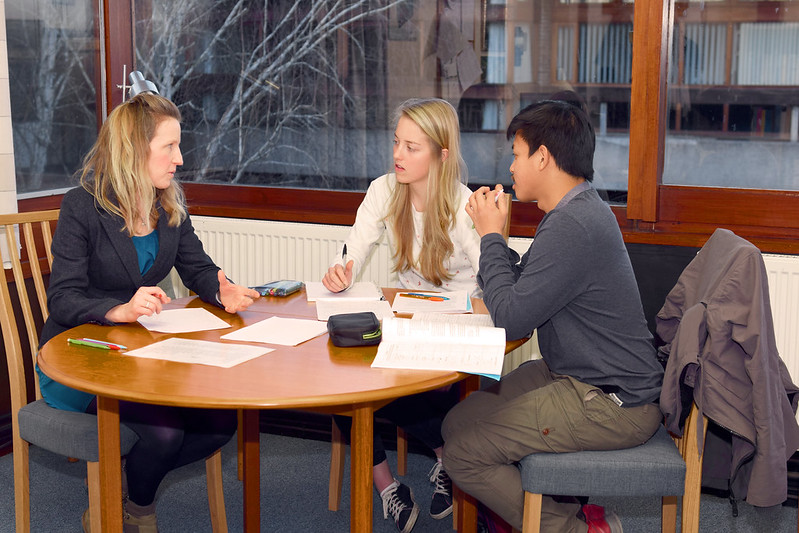
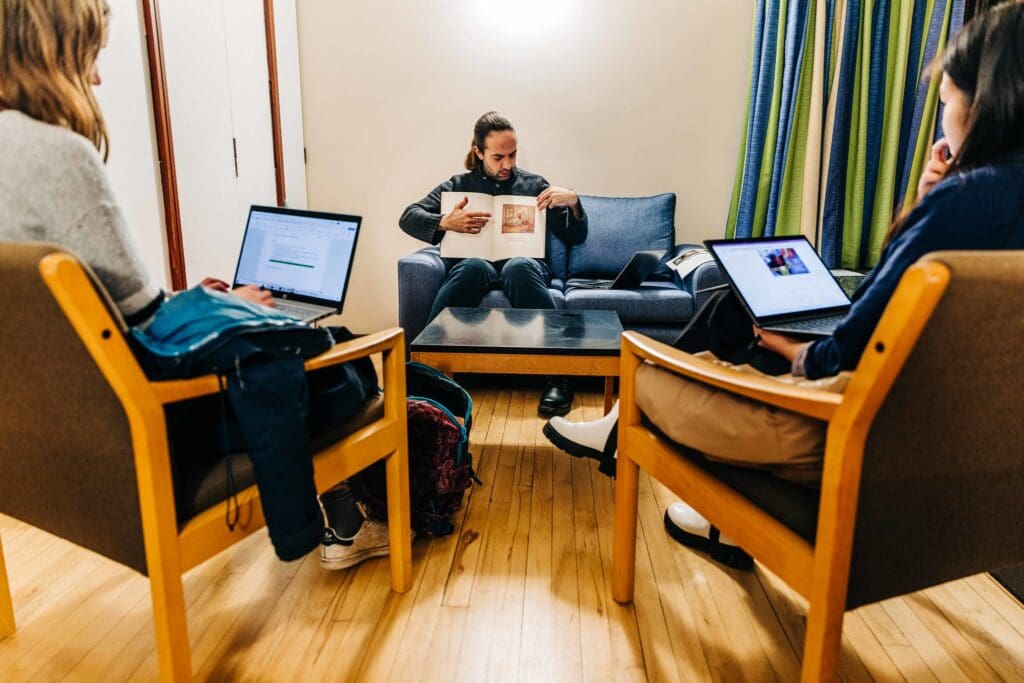
Undergraduate Courses
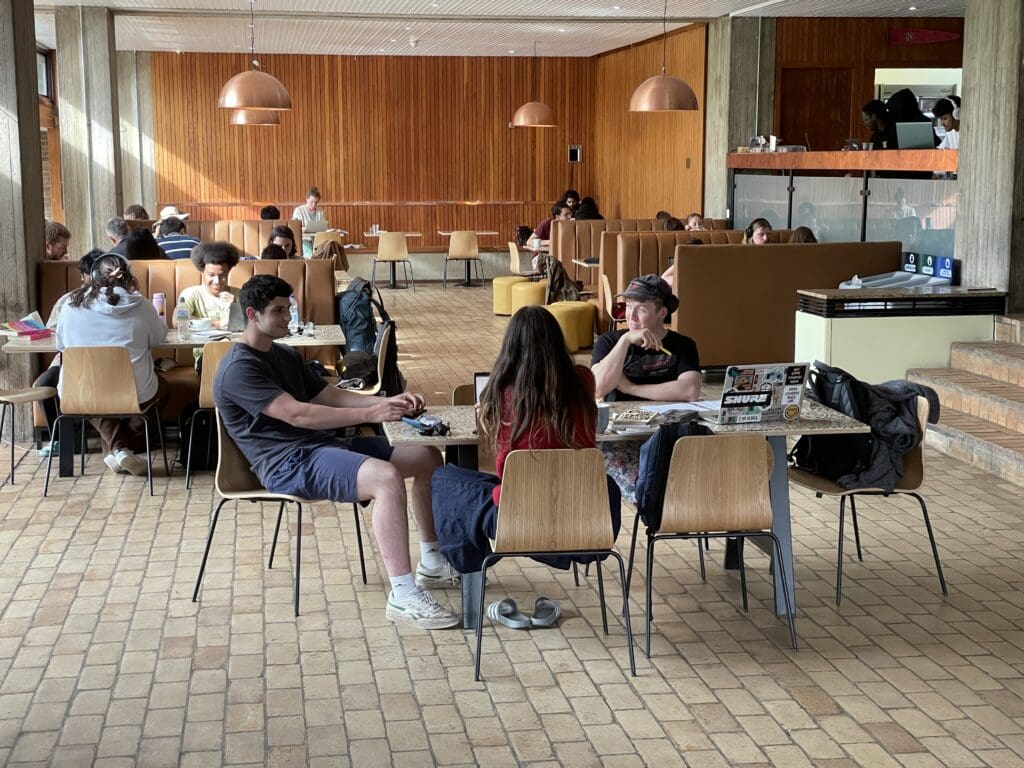
Churchill is unusual amongst Cambridge Colleges, in that 70% of Churchill students study courses within sciences, technologies, engineering, and maths – but as a large College, students in the arts, humanities, and social sciences are numerous.
Consequently, our academic community is advantageously diverse, and a great environment for the future’s thinkers.
You’ll need to know what subject you want to study before you apply, and choosing the course that’s right for you is perhaps the most important preparation you can undertake to make an informed and successful university application. If you haven’t already done so, take a deep dive now to make sure you’re on the correct path. Remember, you don’t necessarily need to pursue a degree in a subject you’ve previously studied at school or college.
Entry requirements
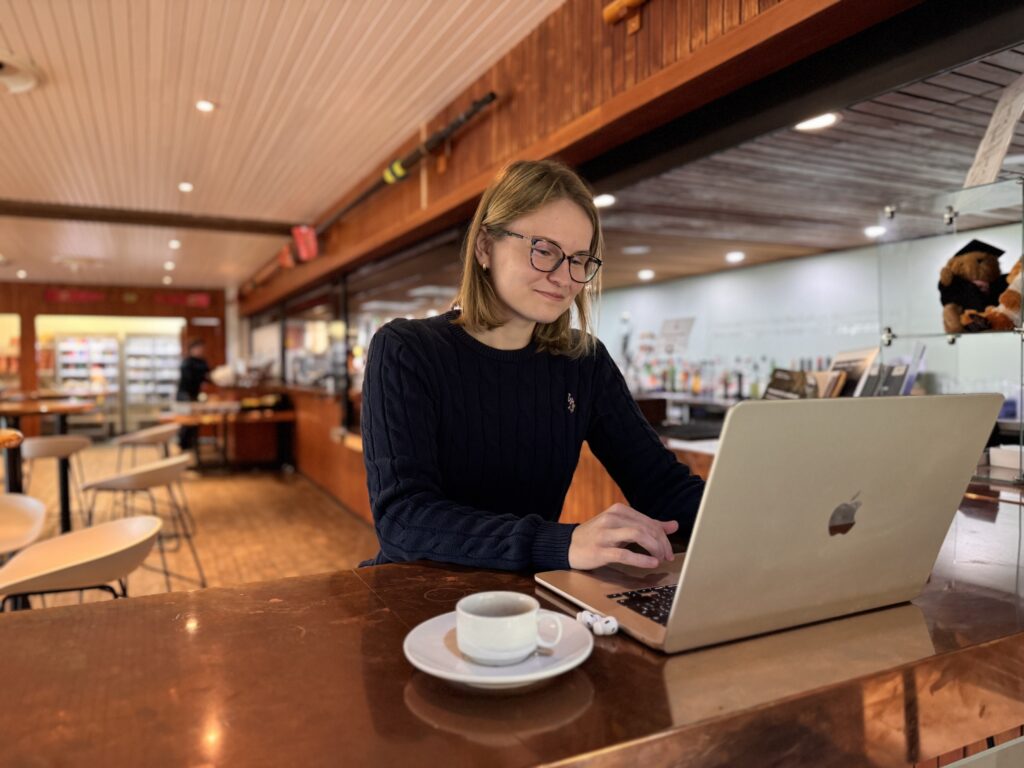
At Churchill, we take a careful, individualised approach to offer-setting, in our students’ interests.
Cambridge seeks to admit students whose academic record places them in the very top percentiles of their cohorts. Consequently, Cambridge applicants are frequently predicted – and achieve – maximal grades in the highest-level academic qualifications they undertake. As such, admitted students usually exceed the University’s minimum offer level, often by quite some margin.
We want to make sure that our entrants each year thrive and excel in the highly academic Cambridge environment, so – in their interests – we tend to set conditional offers in line with the typical attainment of Cambridge entrants, by course.
Our offers sometimes require students to attain certain grades across a range of subjects taken in a single exam sitting. Again, this is because excelling in exams sat concurrently is a good predictor of success at Cambridge, where courses are mainly exam assessed.
On average, this approach allows Churchill to make a relatively generous number of offers per place each year. However, it also means that our requirements are usually a little more rigorous than the University’s minimum offer level and that we rarely depart from them, allowing our offer-holders’ exam outcomes to be decisive in whether or not they are ultimately admitted.
- For courses with a University minimum offer level of A*AA at A Level, Churchill’s typical offer range is A*AA-A*A*A (IB 42-43 overall, 776 Higher Level).
- We may specify grades in particular subjects but we do not do so routinely.
- For courses with a University minimum offer level of A*A*A at A Level, Churchill’s typical offer range is A*A*A-A*A*A* (IB 42-43 overall, 777 Higher Level).
- We may specify grades in particular subjects.
- If you’re applying to read Engineering or Mathematics then we’ll require you to get an A* in Further Mathematics. If you’re not taking Further Mathematics, we won’t be able to progress your application for either of these courses.
- If A Level Further Mathematics is available at your school/college, we expect you to take it and achieve (be confidently predicted) an A* in it, if you are applying for Computer Science, Economics or Natural Sciences Physical. This is because most Cambridge entrants for these courses from A Level background present Further Mathematics, and we want to admit you with the best possible preparation to thrive.
- For Medicine, Churchill’s typical A Level offer is A* in Chemistry and A*A among Biology, Physics, Mathematics, and Further Mathematics (IB 42-43 overall, 7 in Higher Level Chemistry, and 76 among Biology, Physics, and Mathematics).
Fees and costs
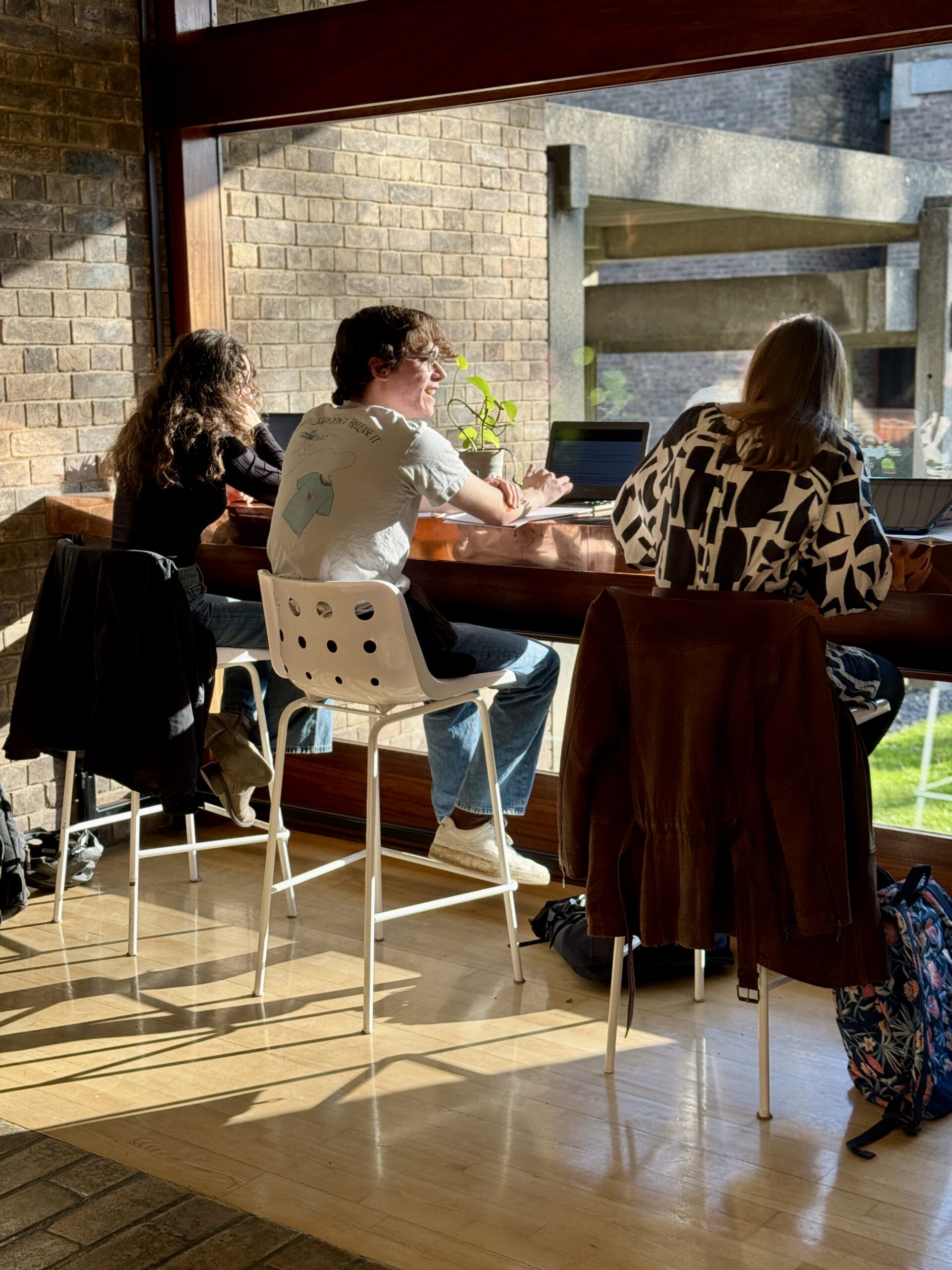
We know costs can be a concern.
Cambridge University tuition fees are the same as most other universities in England. Living costs are often cheaper because undergraduates are usually only in residence – and only pay rent – during our University terms; a total of 30 weeks per year.
Please note that international students and home students undertaking a second undergraduate degree are required to pay an extra College Fee. This is not to be confused with College charges, explained below, which are paid by everyone. For details about College Fees, if these are potentially relevant to you, see the “Undergraduate Tuition Fees” documents on the University’s Tuition Fees webpage.
We’ve a range of support available, and all UK students applying for a student loan to the SLC will be automatically considered for a Cambridge Bursary provided they do not tick the box opting out of sharing financial information with the University.
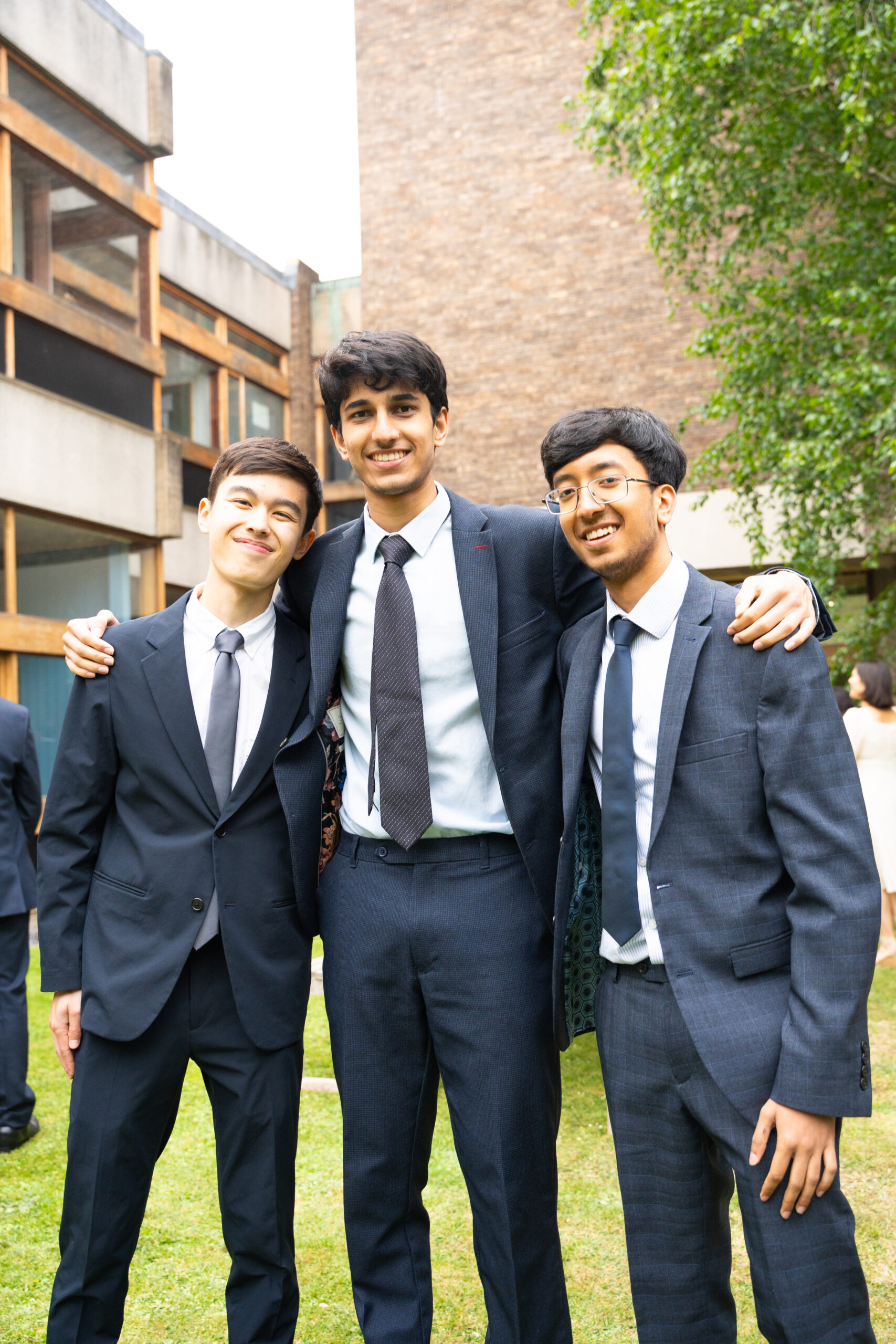
College charges and rent
At Churchill, College charges are billed monthly, with the exception of rent which is billed termly in advance. These cover your rent (if you live on-site) and any additional charges you incur, like meal purchases, printing, and electricity.
Your rent includes central heating, internet access in your room, wireless internet around College, and use of catering services and other facilities on-site (the gym, for example). Each room is banded and rents in the academic year 2024-25 range from £156.00 – £261.70 a week. Rents are determined annually, in agreement between College and student representatives.
Rent is normally payable for just 30 weeks, which covers the periods of residence dates set by the College. Rent is paid termly, in advance, at the beginning of each term.
Termly rent is normally made for a minimum of 10 weeks. If you accept a room in College, you will be liable for rent for the whole academic year. This does not include vacation periods, which are outside the 30-week periods of residence. During vacation periods and subject to availability, it may be possible for you to remain at Churchill, though not necessarily in the same room you have during term-time.
Every student at Churchill is required to pay a Membership Bond of £250. This will be returned at the end of your studies, as a refund against your final bill.
Additional Charges
Other College charges include:
- Food purchased in the Dining Hall and Buttery
- Electricity (not heating) used in your room
- Competitive room contents insurance (about £15 per annum) against theft of belongings from your room
- Printing charges
Every two weeks during term, you will be sent an email with a breakdown of the food and drink you have purchased in College using your University card, so you can keep track of your spending.
Student Handbooks
As part of the College community, you’ll be expected to abide by the terms of both the Undergraduate Student Handbook and the Accommodation Handbook.
Application process and deadlines

Cambridge Colleges, including Churchill, have a common application process, which is explained on the University’s Applying to Cambridge website and the pages linked from it. Read these carefully.
Also, review application dates and deadlines and adhere to everything that is relevant to you. Amongst other potential details, note that some of your application may require contributions from other people which need to be completed within strict timeframes, and/or that you may need to register for a certain admissions test or assessment before your application proper is submitted.
It is your responsibility to make sure that all parts of your application are completed in full and on time. Regretfully, we cannot continue with applications that include late or missing components.
All applications received by the relevant deadline(s) are carefully and holistically considered before we make conditional offers to those students who are most competitive within our gathered field. We will typically invite around 3/4 candidates to interview before making conditional offers.
How we select
Churchill runs a data-driven admissions process.
While we heavily prioritise exam results as a key indicator of academic potential, we actively encourage applications from all backgrounds, and we know that not everyone has the same educational opportunities.
To address this, we carefully and holistically review every application we receive, placing your results within your educational context and paying close attention to what is written about you by your teachers or lecturers in your UCAS reference.
In comparison with the University’s applicant fields by subject, the students we invite to interview have normally done very well in one or more of:
- Public examinations and assessments;
- Grade predictions, underpinned by convincing supporting evidence;
- Admissions assessments and/or submitted written work.
Most interviewees are also supported by UCAS references which assert that they are very high performing in context.
We assess applications as objectively as possible, with application profiles being moderated at both College and University levels. Our assessment considers:
- Recent academic achievement, as evidenced by GCSEs, A Levels, other school-leaving qualifications, and high school transcripts;
- Quality of UCAS references and predicted grades, noting our comments above about conditional offers;
- Evidence of interest in the target degree and of engagement with it outside the classroom;
- Contextual factors, such as signalled in the UCAS application, My Cambridge Application, etc.;
- Geo-demographic data and school-level indicators;
- Where relevant, performance in admissions assessments and/or supporting materials, such as written work, portfolios, etc.;
- Where relevant, performance in standardised tests of English language proficiency, like IELTS and TOEFL;
- Performance at interview, if invited.
After we have carefully and holistically considered all the applications we receive, we make conditional offers to those that are most competitive within our gathered field.
These applicants often combine the highest grade achievements and/or predictions with UCAS references which indicate, with evidence, that they have been consistently and unequivocally performing at the absolute top of their cohort(s). The most outstanding applicants tend to present exceptional performance in other areas too, like admissions assessments (where relevant) and/or interviews.
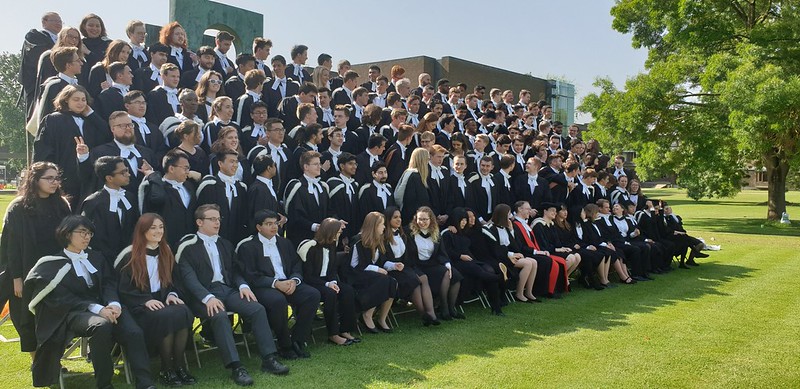
Interviews
Undergraduate admissions interviews at Cambridge are not interviews in the conventional sense.
Rather than conventional interviews, they are interactive aptitude tests, pursued by discussion.
At Churchill, we usually interview between 2/3 and 3/4 of our undergraduate applicants each year. Most interviewees have a single interview, typically with two interviewers (occasionally a third person is present as an observer). Our interview slots are normally 45 minutes long, though the actual interview duration tends to be in the range of 30-40 minutes.
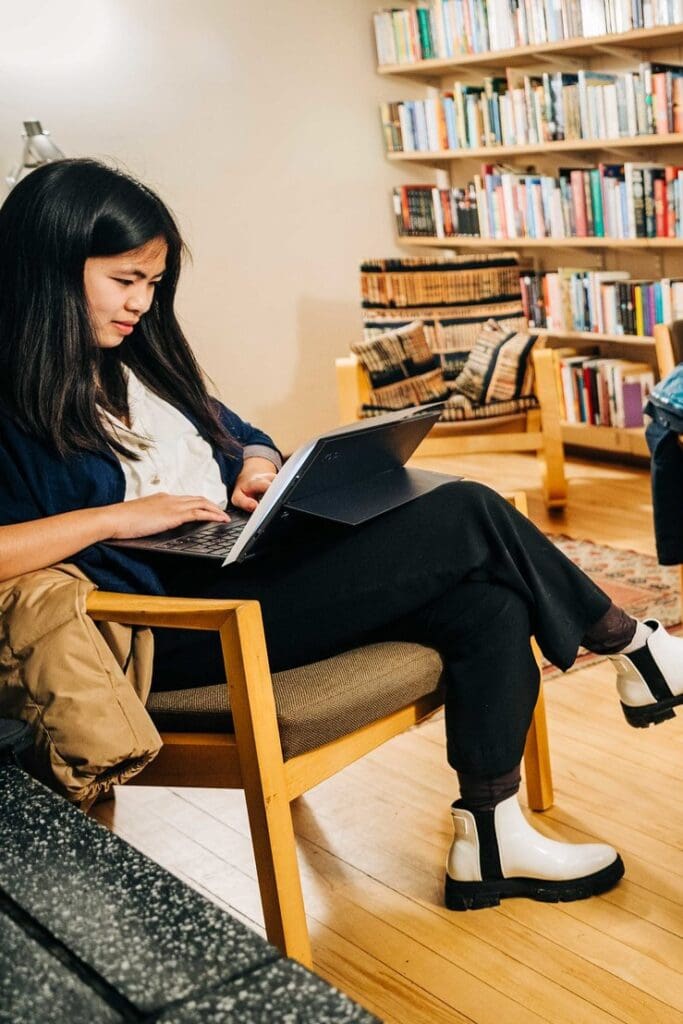
Though the format varies from college to college and between subjects, all essentially have the same two functions.
For us, they give our subject experts an opportunity to meet you and assess your academic ability.
For you, they’re a bit like Cambridge supervisions, so they give you a chance to experience the way we teach and decide whether you feel you’re suited to it. To these ends, our interviews are typically based around academic problems to which we will ask you to seek solutions, assisted as appropriate by your interviewers, usually via discussion.
Some interviews require pre-reading or a preparation exercise, in which case we will assign time for this before the interview proper.
At Churchill, we usually interview between 2/3 and 3/4 of our undergraduate applicants each year. All our interviews are conducted online, using Zoom. Most interviewees have a single interview, typically with two interviewers (occasionally a third person is present as an observer). Our interview slots are normally 45 minutes long, though the actual interview duration tends to be in the range of 30-40 minutes.
If you are asked to interview, we’ll advise you to use a computer with a webcam and microphone, though a tablet or phone will work perfectly well. Provided we can see and hear each other clearly, that’s fine.
We’ll ask you to find somewhere quiet for your interview where you won’t be disturbed, with the fastest and most stable internet connection available to you. For many interviewees, school or college is the best place, in which case make sure to check with your teachers or relevant staff members in advance that an appropriate space will be available.
Here are a couple of videos, showing what you can expect from online interviews and how you can prepare to show your workings in interviews where writing and/or sketching may be required.
The subject shown here is Engineering but the principles of how Cambridge interviews work – that they’re collaborative conversations based around problem solving, like the University’s supervision teaching – are transferable to all courses.
We’ll ask you to have some paper and a pen handy, preferably a thick black “sharpie”-type pen, so you can easily share workings, sketches, and written ideas, particularly for technical subjects including (but not necessarily limited to) Architecture, Computer Science, Design, Economics, Engineering, Mathematics, Medicine, Natural Sciences, and Veterinary Medicine.
We might ask you to type into a shared document and if you have a device with a touch screen and stylus that you’re comfortable using then we may suggest that you use it to sketch or write ideas or equations. Again though, always have paper and pen as a backup.
To check for any details about the interview format in your chosen course, see our Courses webpages. There may also be some variations between how different Colleges run their interviews. However, broad principles apply.
To prepare, the best thing you can do is revise, particularly:
- Relevant content from school or college;
- Your UCAS personal statement;
- Any written work we have asked you to submit.
Additionally, it’d be good to become familiar with talking about your subject and academic interests with peers and/or teachers. However, extensive practice in interview ‘technique’ is neither expected nor, in our experience, useful.
Admissions statistics
We’re often asked about the backgrounds and profiles of our undergraduates, so here are some recent key data.
These percentages are for the undergraduates we admitted in the October of each given year, correct as of the end of the preceding August (when the previous UCAS cycle formally ends). Gender and fee status are given as percentages of total entrants. School type and contextual data are given as percentages of entrants with home fee status.
Inquirers are regularly interested too in how many students apply and are admitted annually, both to each course we offer and to the College overall. As a rule of thumb, if Churchill offers entry to a degree then we’d ideally wish to admit at least one undergraduate to it per year (though this isn’t always possible, especially in small subjects).
If you’d like to know more, there’s an interactive graph generator which shows these and other data on the University’s Application Statistics webpage. To be clear, knowing these data doesn’t confer any advantage in the admissions process, for the reasons explained on that page, namely the University’s pooling system of applicant moderation.
| Entry Year | 2024 | 2023 | 2022 | 2021 | 2020 | |
|---|---|---|---|---|---|---|
| Gender * | Female | 48% | 50% | 49% | 47% | 50% |
| Male | 48% | 50% | 51% | 53% | 50% | |
| Other * | 4% | |||||
| Fee Status | Home | 76% | 74% | 75% | 80% | 74% |
| Overseas | 24% | 24% | 25% | 20% | 26% | |
| Home School Type | Maintained | 67% | 77% | 75% | 80% | 77% |
| Non-maintained | 33% | 23% | 25% | 20% | 23% | |
| Home Contextual Data | Free school meals | 7% | 8% | 10% | 8% | 6% |
| IMD Q1&2 | 22% | 22% | 25% | 15% | 17% | |
| OAC2011 | 20% | 16% | 25% | 20% | 21% | |
| POLAR4 Q1&2 | 11% | 13% | 14% | 13% | 16% | |
* Before 2024, female and male were the only gender choices available in UCAS.
You may also be interested in:
